
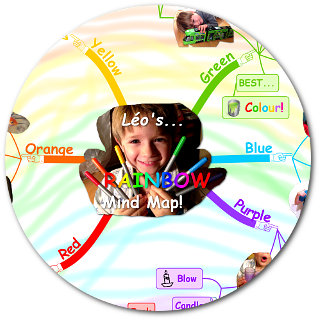 Being the spontaneous sort, I reckon I can structure this article around what I just imagined in the sentence above: various ways I’ve used this mind map thus far. And it ain’t over till the Mad Mapper sings!
Being the spontaneous sort, I reckon I can structure this article around what I just imagined in the sentence above: various ways I’ve used this mind map thus far. And it ain’t over till the Mad Mapper sings!
I’ve used Léo’s Rainbow Mind Map to:
? Explain mind mapping principles
? Get people excited about the idea
? Teach the colours to pupils
? Stimulate the imagination
? Have creative fun with my son
? Promote my new English school*
Keep on reading the full article just after the download links below – hope you like it!
*Which just happens to be called… wait for it… Rainbow English School!
JPG Image 800 px ~ JPG Image 1920 px ~ JPG Image 3500px
PDF Document ~ Sab on Biggerplate!
JPG Image 800 px ~ JPG Image 1920 px ~ JPG Image 3500px
PDF Document ~ Sab on Biggerplate!
JPG Image 800 px ~ JPG Image 1920 px ~ JPG Image 3500px
PDF Document ~ Sab on Biggerplate!
![]()
Feel free to use my “Léo’s Rainbow Mind Map” mind map as follows:
1) For any NON-commercial use
2) Leave it EXACTLY as it is
3) Don’t change ANYTHING
4) Make sure the © Copyright text is included and intact
5) See 2) and 3) (you get the idea!)
You CAN reproduce it online or embed it in your blog or website as long as you…
6) Respect 1-5 above
7) Include a credit to ‘Sab Will / Mind Map Mad’ AND include a clickable link to THIS page ( http://www.mindmapmad.com/leos-rainbow-mind-map/ ) on the web page next to or near the image – thanks!
Anyway, it’s a place absolutely crammed with cool mind maps, including mine – he he! You can download the actual original iMindMap file (the mind mapping software I use) and play around with it yourself. Nice!
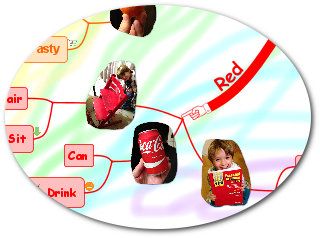 This mind map is very straightforward and pretty much follows Tony Buzan’s original mind mapping recommendations to the letter.
This mind map is very straightforward and pretty much follows Tony Buzan’s original mind mapping recommendations to the letter.
As such, it is a useful tool to show what a relatively simple mind map which respects these rules can look like.
It is debatable as to what extent we should talk about ‘rules’ when it comes to using such a flexible tool. Personally, I believe in understanding the basics and then bending those guidelines to suit our creative purposes onces we’ve fully grasped them.
These famous rules include some of the following features from Léo’s Rainbow Mind Map, in case you were wondering…
➽ A horizontal (landscape) layout, not portrait
➽ Big symbolic central image
➽ One word per curvy line
➽ Lots of fun images throughout
➽ Branches & words get thinner & smaller
➽ Utterly colourful (of course, what else?!)
![]()
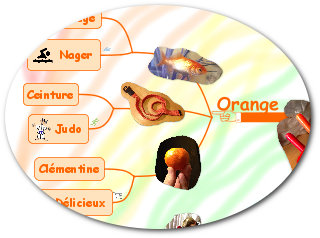 It’s funny sometimes when I hear or read people extolling the marvellous life-changing properties of mind mapping like a snake old salesman, but illustrating their talks with the crummiest, saddest, most boring and badly-constructed examples of mind maps you could ever imagine.
It’s funny sometimes when I hear or read people extolling the marvellous life-changing properties of mind mapping like a snake old salesman, but illustrating their talks with the crummiest, saddest, most boring and badly-constructed examples of mind maps you could ever imagine.
I don’t do that! I show them some crazy, wild and wonderful examples but that’s not always the best approach either! If potential mind mappers see stuff that looks too complicated or sophisticated they may end up thinking they could never produce anything similar and carry on their way with everyone so much the poorer.
My answer is to show them something extremely eye-catching but still relatively easy to ‘get’, which relates closely to some aspect of their life, whilst offering some insight into some aspect of mine. Personalisation is vital aspect of effective mind mapping.
Léo’s Rainbow Mind Map has worked well on all these counts over and over again for me. It’s certainly eye-catching, I’m talking with enthusiasm about my son, and for many parents or teachers it’s easy for them to see how they could do something very similar with their own kids. Bingo!
![]()
It might seem fairly obvious, but the primary reason for this mind map was to help Léo learn his colours, which he had just done a lesson on at his school here in France.
When I heard that he’d been studying (or at least singing about or playing with) the colours of the rainbow in his little English slot, I thought, wow, what a great topic for a mind map!
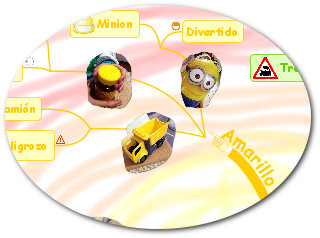 As you’ll see in the final point below, me and rainbows go deep, so don’t mock it!
As you’ll see in the final point below, me and rainbows go deep, so don’t mock it!
And as I explain to parents and anyone who’ll listen to me actually, this particular mind map is one of my most personally pleasing creations ever ?
You can make this map as simple or as complex as you like. Here I’ve chosen the middle route, limiting it to six colours (the main branches) and three hierarchical levels, the second of which is just pictures.
If the kids are younger, you can use just four colours, which I also did recently with kids between 6 and 9 years old in our Rainbow English School – the Rainbow Class, appropriately – and it worked well.
In class you will be doing the mind maps by hand, which is much better and generally the only option of course. I gave them a model with the branches already present but printed very palely for them to colour. This was because it was their very first introduction to mind mapping and I wanted to make sure it was a gentle one. I also wanted them to go away with something that looked like a proper mind map!
I also gave them cut out pieces of paper with the colour words for each of the main branches lightly printed on them in pale grey. The challenge was for the kids to stick the words onto the right branches and colour them appropriately. They did fine, give or take the odd upside down word or misplaced item.
On the outlying branches they drew simple little pictures of things which are typically that colour, such as green apples or yellow bananas or blue waves. For older students I ask them to think of something more symbolic, such as an angry face for red or a cold thermometer for blue. As you’ll see below you can go much further with this activity if you wish.
![]()
Simply by mentioning the name of a colour is usually enough to instantly conjure up some connection or connotation or other.
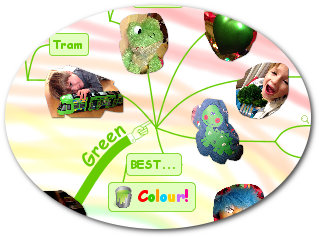 From the most basic emotions through every day objects to sophisticated artworks, our senses and memories are cocooned in colourful impressions of every shade and hue.
From the most basic emotions through every day objects to sophisticated artworks, our senses and memories are cocooned in colourful impressions of every shade and hue.
What’s your favourite colour? Or maybe you have several. But what makes one colour more appealing (or appeasing) than another? These are questions which intrigue and frustrate me in equal measure.
Whole books and probably a whole lot of nonsense has been written about colours and their real or supposed influence on our very souls.
What I know for sure is that I love playing around with them in all their guises and that a world without colour would be a very sad place indeed!
Get inspired by anything and everything that comes to your mind when contemplating all the colours of the rainbow on a soggy sunny day and let them infiltrate your being and shine from your eyes wide in wonder.
![]()
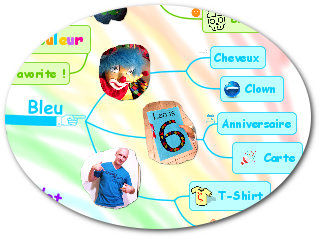 What I really wanted to do was run around the house with Léo taking pictures of him and his stuff and even me (fat dad from the map!) with all manner of curious items in copiously appropriate colours for each branch.
What I really wanted to do was run around the house with Léo taking pictures of him and his stuff and even me (fat dad from the map!) with all manner of curious items in copiously appropriate colours for each branch.
So we did. As you can see from the final result we had a lot of fun. In fact, not only did Léo spontaneously find the objects we would incorporate into the design, but he also suggested, with my prompting, the secondary words which would double the number of vocabulary items we’d end up with.
For his goldfish I asked him what a fish does. He swims. So “swim” became our second word. For the lorry I asked him what it made him think of. He thought of “dangerous” because that’s what I say when we see one in the street. “Dangerous” became the second sub-sub-branch of the “lorry” sub-branch.
You may also have noticed that whilst most of the colour branches have three pictures, the green branch has five. This relates directly to one of the underlying and most important principles of “proper” mind mapping: personalisation.
The more individualised the mind map the more effective it is. There are five pictures on the green branch, quite simply, because green is Léo’s favourite colour. It’s his map, and if it’s to have any real worth then five green pictures it is.
![]()
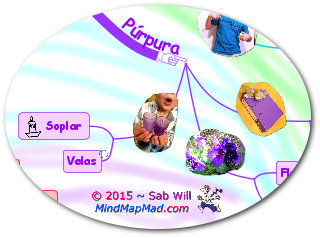 What really fired me up was the idea of creating a cool new map. And of course the idea of doing it with Léo was the icing on the cake. We had a great time doing it and we even recorded him talking about it, which was another father-and-son adventure in its own right.
What really fired me up was the idea of creating a cool new map. And of course the idea of doing it with Léo was the icing on the cake. We had a great time doing it and we even recorded him talking about it, which was another father-and-son adventure in its own right.
He took it to school to show to his teacher and the whole class ended up doing something along the same lines.
Translating it into French and Spanish was also a rewarding challenge.
But no, ultimately, it was the artistic and creative excitement of producing a new piece which could then serve as an easy way in to this rather strange world for anyone interested.
And rather like the chicken and the egg, I’m now really not sure which came first: Léo’s Rainbow Mind Map or the idea for starting an English school in the little French town where I live which ended up being called the Rainbow English School. The school that is, not the town, which kept its original name.
Rainbow English School is now, I’m pleased to say, A Thing, and you can find out more by visiting the Rainbow English School web site. And guess who’s riding up high there on the home page… well whaddya know… it’s Léo smiling away cheerfully in the middle of his wonderful rainbow mind map!
![]()
© 2016 Sab Will / Mind Map Mad
 If you’d like to join our friendly mind map discussion groups on Facebook to learn more about mind mapping and submit your own creations, then you’re welcome!
If you’d like to join our friendly mind map discussion groups on Facebook to learn more about mind mapping and submit your own creations, then you’re welcome!
Just click one or more of the buttons below and join up
straight away – I look forward to meeting you there 😀
JPG Image 800 px ~ JPG Image 1920 px ~ JPG Image 3500px
PDF Document ~ Sab on Biggerplate!
JPG Image 800 px ~ JPG Image 1920 px ~ JPG Image 3500px
PDF Document ~ Sab on Biggerplate!
JPG Image 800 px ~ JPG Image 1920 px ~ JPG Image 3500px
PDF Document ~ Sab on Biggerplate!
![]()
Feel free to use my “Léo’s Rainbow Mind Map” mind map as follows:
1) For any NON-commercial use
2) Leave it EXACTLY as it is
3) Don’t change ANYTHING
4) Make sure the © Copyright text is included and intact
5) See 2) and 3) (you get the idea!)
You CAN reproduce it online or embed it in your blog or website as long as you…
6) Respect 1-5 above
7) Include a credit to ‘Sab Will / Mind Map Mad’ AND include a clickable link to THIS page ( http://www.mindmapmad.com/leos-rainbow-mind-map/ ) on the web page next to or near the image – thanks!
Anyway, it’s a place absolutely crammed with cool mind maps, including mine – he he! You can download the actual original iMindMap file (the mind mapping software I use) and play around with it yourself. Nice!
 Sab Will enjoys creating fun and helpful mind maps and articles on a wide range of topics.
Sab Will enjoys creating fun and helpful mind maps and articles on a wide range of topics.
As well as Mind Map Mad (this site!) Sab runs
Sab is available for training in innovative thinking, creative problem solving, mind mapping and teacher training in modern ‘learning to learn’ techniques. Please get in touch here to find out how increased creativity and innovation can help boost your business, or how modern approaches to learning can revolutionise your teaching or training.
P.S. Keep up to date will ALL Sab’s latest creative output over on his newest home on the web, the Sab Lab!
© 2016 Sab Will / Mind Map Mad